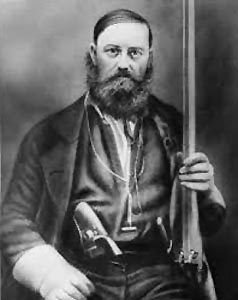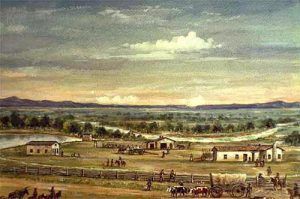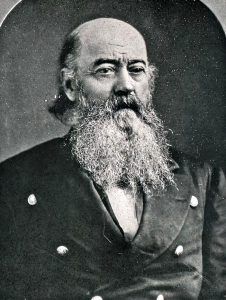
Joseph Meek
Joseph Lafayette “Joe” Meek was a trapper, trader, pioneer, lawman, and politician who was important during the establishment of Oregon Territory.
Meek was born in Washington County, Virginia, near Cumberland Gap, on February 9, 1810, to Captain James Meek, Jr. and Spicy Walker Meek. Meek was propelled westward at an early age by a disagreeable stepmother. He first went to Lexington, Missouri, where he joined two of his brothers.
In 1829, at the age of 19, he signed on with William Sublette as a Rocky Mountain Fur Company trapper, and for the next eleven years, he lived the strenuous life of a mountain man. The young man soon traveled with a trapping party along the Yellowstone River when a band of Blackfeet Indians scattered the trappers. Meek then explored what is today Yellowstone National Park. He would later describe it in his biography:
“The whole country beyond was smoking with the vapor from boiling springs and burning with gasses, issuing from small craters, each emitting a sharp whistling sound.”
He took part in the celebrated Battle of Pierre’s Hole, Idaho, in July 1832 and, the following year, became a free trapper. Meek accompanied Joe Walker on his California expedition of 1833-1834, being one of the first Americans to travel overland to California.

Rocky Mountain Rendezvous by William Henry Jackson
After he returned, he took part in the final Green River’s Ham Fork rendezvous of the Rocky Mountain Fur Company in the summer of 1834.
Somewhere along the line, he married a Nez Perce woman named Unentucken Tukutsey, “Lamb of the Mountain.” She bore him a daughter in 1838 named Helen Mar Meek. His first wife died in an attack by a Bannock raiding party, leaving him alone with his new baby daughter. He soon was given a new wife by Nez Perce Chief Kowesota. Her actual name is unknown, but Meek called her “Virginia.”
By 1840, the trapping industry was declining, and Meek, his wife, and another trapper named Robert Newell traveled to the Willamette Valley in Oregon, arriving on December 15, 1840. There, he worked for various farmers and guided the early wagon trains to Oregon. In 1841, he settled in Washington County, Oregon, and farmed for himself. He served as sheriff in 1843 under the newly formed Provisional Government. By 1845, he had prospered and won a seat in the provisional legislature.
On November 29, 1847, the Whitman Massacre occurred. Not only did Meek lose his friends, Marcus and Narcissa, but his daughter, Helen Mar Meek, was there at the time of the attack. She was just nine years old and one of 49 people who were kidnapped. She died in captivity. Early the following year, Meek traveled to Washington, D.C., with the news of the killings and the ensuing Cayuse War. In Washington, he met with President James K. Polk, who was married to his cousin and argued forcefully for making the Oregon Country a federal territory.
Congress approved his requests the following year, and Meek was appointed the territory’s Federal Marshal, a post he held for the next five years. In this position, Meek oversaw the 1850 execution of the Indians found guilty in the Whitman Massacre.
In 1855, he played a leading part in the Yakima War, organizing the Oregon Volunteers and winning the rank of Major for his service. Afterward, he was involved in politics, became an avid Unionist, and helped form the Republican Party of Oregon.
On June 20, 1875, Joe died at his home at the age of 65. His wife, Virginia, survived him by almost 25 years. She died on March 3, 1900. They are both buried at the Tualatin Plains Presbyterian Church cemetery north of Hillsboro, Oregon.
At one time, Meek had said:
“I want to live long enough to see Oregon securely American… so I can say that I was born in Washington County, United States, and died in Washington County, United States.”
His older brother Stephen Meek was also a trapper and became known for his role in the ill-fated Meek Cutoff.
© Kathy Alexander/Legends of America, updated February 2024.
Also See:
Trading Posts of the Mountain Men
Trappers, Traders & Pathfinders
Sources:


